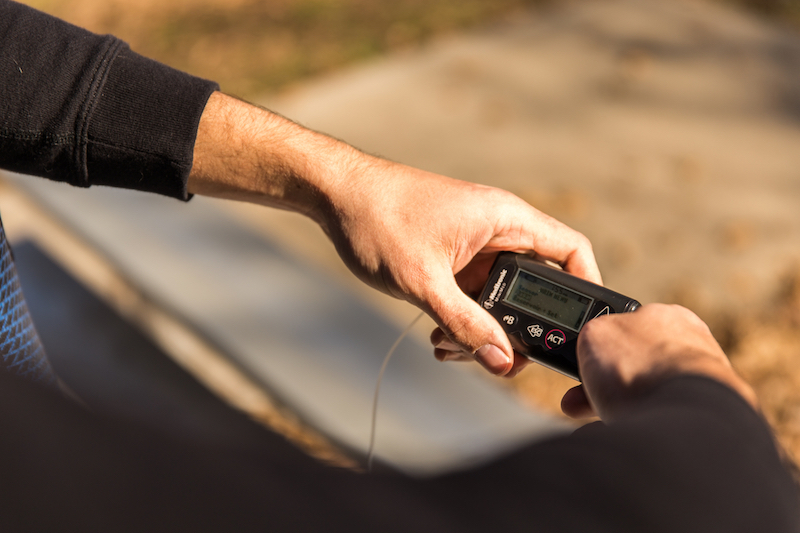Last September I celebrated two 10-year anniversaries, one being my wedding and the other the day I discovered I was a Type 1 diabetic. I was 24 years old, had graduated from college, and was working before heading to seminary. And I’d just married my college sweetheart.
By all accounts I was a relatively fit and healthy young person with much energy to spare. I wasn’t overweight, didn’t eat sugary foods all day, played basketball several times a week, and kept a good work ethic. There was nothing that would lead you to wonder whether I had diabetes.
But that fateful day came just three weeks into marriage, and I had no control over it. Now, a decade later, I reflect back on it with thankfulness to God.
Unhealthy Pursuit

Though the diabetes diagnosis initially led me to a disciplined, healthy lifestyle, that mindset quickly dissipated. More and more I let food become a controlling factor in my life, shaping my decisions. I’d keep track of my disease and see doctors regularly, but I often disregarded the diet altogether. I took what I wanted, when I wanted it, with no regard to the consequences.
In other words, I pursued instant gratification. If I was hungry, I was hungry for something a diabetic shouldn’t have. And since I could take it, I did. Like Adam and Eve in the garden, I saw that the fruit was pleasurable and would make me wise (i.e., satisfy my appetite). And I took it, over and over, to my demise.
Unexpected Spiritual Health
The unsuspecting thing diabetes did for me, however, was to expose my sin in unexpected ways. And this is why I say I’m thankful. God revealed that my desire to satiate my physical appetite with bad food (detrimental to my overall health) would lead me to satiate my spiritual appetite with sin (detrimental to my soul).
My unhealthy lifestyle was indeed sin, which only confirmed what was already troubling my conscience: I felt guilty about my actions nearly every time I indulged them. I knew what I should be doing to remain healthy, yet I spurned knowledge. All the positive signs of living a spiritual life were present, but in my heart there was a disregard for personal holiness on this issue.
This realization changed my perspective, for it meant controlling diabetes was no longer just a matter of my personal wholeness but of personal holiness.
I’m still trying to walk faithfully as a diabetic today, seeking to honor God with my daily choices. Since kingdom principles fuel kingdom living, I’ve sought to put off old practices and put on new ones. Here are seven things I’ve learned over the last 10 years.
1. God gave me diabetes.
Whenever I choose to live healthily as a diabetic, I’m submitting to God’s authority as the author of life. He gave me this disease to show he’s most satisfying.
So my prayer as a diabetic is Psalm 63:1: “O God, my soul thirsts for you. My flesh longs for you.” I know my everyday dietary choices will leave me ultimately unsatisfied by the promise of earthly pleasure. Bread doesn’t satisfy the longing of my heart; God does.
2. God is most glorified in my diabetes when I am most satisfied in him.
If my aim in life is to please God—and if God himself is the highest good I can attain—then I must satiate my spiritual appetite on him, who offers water to the thirsty and bread to the hungry. Being made in God’s image means living in God-honoring ways. When I view my body as a “temple” (1 Cor. 6:19), I’m motivated to a way of life that doesn’t get caught up in the latest dietary craze but takes seriously the image of God. Ultimately, living as a healthy diabetic means living for Christ.
3. God is glorified in my body when I discipline it to live a long life of service to him and the church.
I do no service to my family or my ministry if I live slovenly. The apostle Paul speaks of disciplining his body to run a race (1 Cor. 9:24–27). This picture directly relates to my life as a diabetic: My fight to be a healthy diabetic requires tremendous toil, just like the fight for personal holiness. For me, the two are inseparable.
4. The food choices I make have direct consequences on my family.
Diabetics routinely died in their 30s and 40s just a century ago. However, with advanced medical technology—insulin pumps and continuous glucose monitoring—I can now live as long as a non-diabetic.
Kingdom living means honoring Christ, fueled by kingdom principles about obedience to Jesus and submission to his Word. A wise person hears Jesus’s words and does them (Matt. 7:24). For the sake of my family, that’s the sort of person I want to be.
5. Self-control is a fruit of the Spirit. So if I discipline my body, I’m displaying the Spirit’s work in my life.
If I am not walking in the Spirit, I am gratifying the desires of the flesh—in my case, the temptation to repeatedly indulge in unhealthy food. These desires are “against the Spirit,” Paul says, and actually keep me from doing the things I want to do (Gal. 5:17). Therefore, I want to crucify the flesh with its desires and submit to Christ steadfastly.
6. Taking insulin every day is a reminder God provides for all my needs.
Synthetic insulin is now made in a lab, but it used to come from pigs. Can you believe that? There were people out there raising hogs in order to take their insulin-producing beta-cells, create more insulin, sell it to pharmaceuticals, and then sell it to me—all so I could live past 40.
I should glorify God for letting me live in our technological age with its excellent medical attention. I’m especially grateful for this each time I walk into the pharmacy to fill another insulin order. I’ll take the lab over the pig any day.
7. I press on to be a good diabetic because I’m convinced Jesus is the Lord of all.
My part as a Christian is to “toil, struggling with all his energy,” as Christ powerfully works within me (Col. 1:29). Jesus promises the reward of eternal life to those who conquer and overcome (Rev. 2–3). So it is Jesus, then, who motivates me to live as a healthy diabetic. It’s more about kingdom ethics than cupcakes and vegetables. Though my outer self is wasting away, my inner self—the more important part—is being renewed day by day (2 Cor. 4:16). And at the end of days, Jesus will eradicate all disease for the glory of his name. So I must live today in light of this great reality.
Full Stomach
Those who bear fruit in every good work and increase in the knowledge of God are fully pleasing to him (Col. 1:10). I want to be that person—not the kind who spurns God’s knowledge, but who yearns for it. The god of the belly is strong indeed (Phil. 3:9), but our appetites only confirm for us what we already know: we crave pleasure and satisfaction, and only God can fill the void.
“Oh, taste and see that the LORD is good!” (Ps. 34:8).
20 Things You Can Do Right Now to Prevent Dechurching
 We’re currently experiencing the largest and fastest religious shift in the history of the United States. But there are practical things we can do inside our local churches.
We’re currently experiencing the largest and fastest religious shift in the history of the United States. But there are practical things we can do inside our local churches.
Jim Davis and Michael Graham have commissioned the largest and most comprehensive study of dechurching in America. Informed by their findings, they’ve written a book and developed this corresponding toolkit with resources to help you address the dechurching phenomenon.
We’re delighted to offer you the ‘Rechurching Toolkit’ for FREE today. Click on the link below to get instant access to this resource—worth $100—and be equipped to understand and address the issues behind dechurching.


































